Explanation of my 10 Ballon d'Or 1974
This is my ranking, my opinion on the Ballon d'Or of the year 1974. This ranking is based on the calendar year, not the season. What counts for this ranking is the player's regularity over the calendar year, the number of matches played, the ability to raise his level in big games, statistics (goals, assists, clean sheets, goals conceded, etc.) and trophies won (collective and individual).
#10 Jupp Heynckes
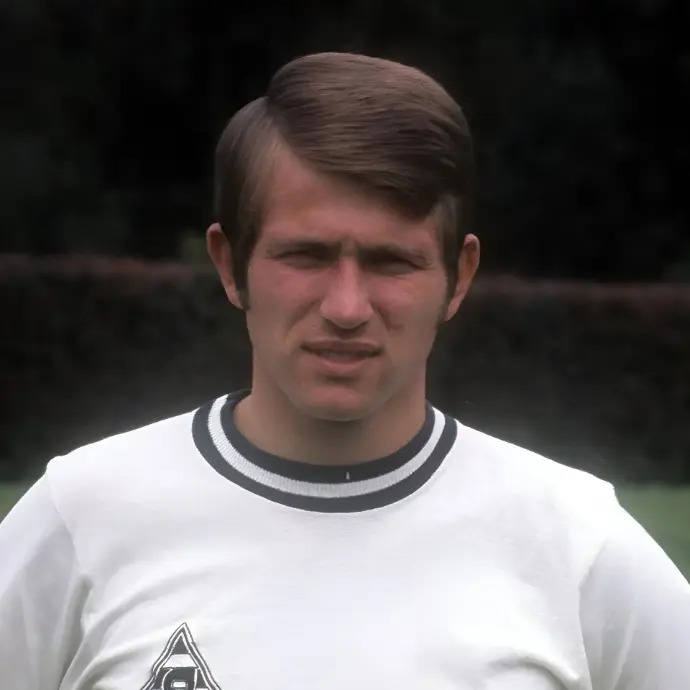
- Age : 28/29 years old
- Club : Borussia M'gladbach
- Statistics : 45 games, 40 goals, 6 assists
- Trophies : World Cup, Bundesliga Vice-Champion
- Individual Awards : Cup Winners Cup TOTY, Cup Winners Cup Golden Shoe (8 goals), Bundesliga TOTY, Bundesliga Golden Shoe (30 goals)
In 1974, Jupp Heynckes was precision in motion—sharp, tireless, and utterly ruthless in front of goal. At 29, he was the spearhead of a Borussia Mönchengladbach side that played with the fury of youth and the discipline of champions. That year, Heynckes didn’t just score—he surged. Twenty-nine goals in the Bundesliga made him the league’s top scorer, a title he shared only with the legendary Gerd Müller. But Heynckes was no shadow. He was a storm of his own. He played with a striker’s instinct and a midfielder’s intelligence. He didn’t wait for chances—he created them. His movement was poetry in straight lines, his finishing a masterclass in economy. And while Müller was the fox in the box, Heynckes was the hawk—watching, waiting, striking with lethal clarity. In Europe, he led Mönchengladbach to the UEFA Cup final, scoring 8 goals along the way. And though they fell to Feyenoord, Heynckes had already made his mark. For West Germany, he was part of the squad that conquered the world on home soil, lifting the 1974 World Cup. He didn’t start the final, but his presence in the team spoke volumes—he was trusted, respected, feared.
#9 Wolfgang Overath
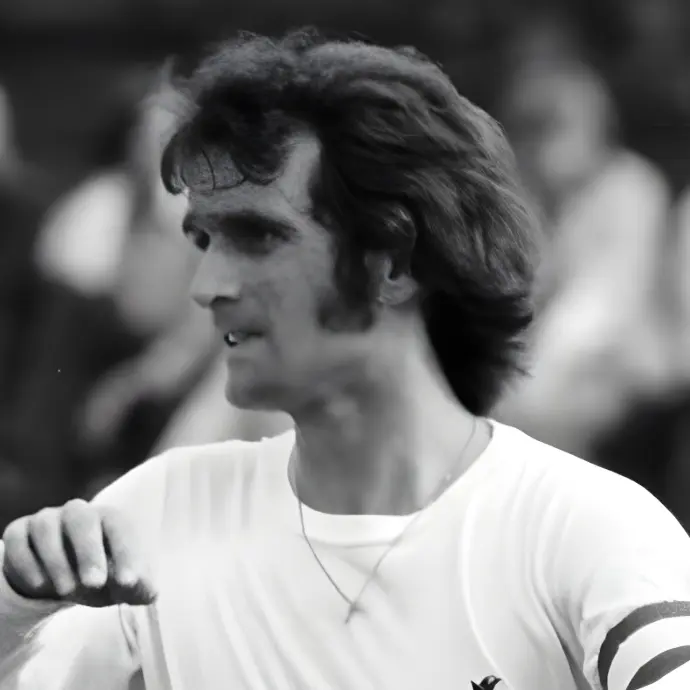
- Age : 30/31 years old
- Club : FC Köln
- Statistics : 50 games, 11 goals, / assists
- Trophies : World Cup
- Individual Awards : World Cup TOTT, Bundesliga TOTY
In 1974, Wolfgang Overath was the quiet architect of triumph—measured, majestic, and utterly indispensable. At 30, he wasn’t the flashiest name in West Germany’s golden generation, but he was its rhythm. That summer, in the heat of Munich, he played his final match for the national team—and walked away a world champion. Overath didn’t dominate with pace or power. He dictated with poise. In a team bursting with stars—Beckenbauer’s command, Müller’s goals, Maier’s saves—it was Overath who stitched it all together. He scored twice in the tournament, but his true brilliance lay in the spaces between the goals: the inch-perfect passes, the subtle feints, the calm in the storm. In the final against the Netherlands, he was everywhere—pressing, passing, leading. And when the whistle blew, it was his 81st and final cap. He left the international stage with a World Cup medal and the respect of a nation. At FC Köln, he remained the heartbeat of the club, loyal to the end. Offers came from across Europe, but Overath never left. He was the soul of the Geißböcke, a one-club man in an era before loyalty became rare. That year, he was named in the Bundesliga Team of the Season, a testament to his enduring class.
#8 Grzegorz Lato
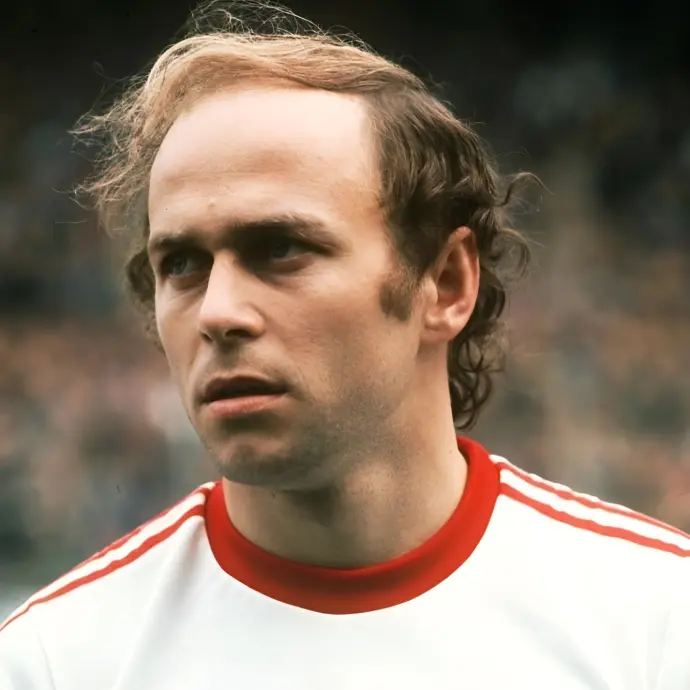
- Age : 23/24 years old
- Club : Stal Mielec
- Statistics : / games, / goals, / assists
- Trophies : /
- Individual Awards : World Cup TOTT, World Cup Golden Shoe (7 goals)
In 1974, Grzegorz Lato was a revelation in red and white—blistering, bold, and utterly unstoppable. At 24, the Polish winger didn’t just announce himself on the world stage—he seized it. That summer in West Germany, Lato didn’t just play in the World Cup. He owned it. Seven goals. That was the tally. More than Cruyff, more than Müller, more than anyone. He didn’t score with flair—he scored with fury. Against Argentina, he struck. Against Sweden, he struck again. And in the third-place match against Brazil, he sealed Poland’s greatest footballing triumph with the only goal of the game. He wasn’t just the tournament’s top scorer. He was its pulse. But Lato was more than a finisher. He was a force of movement—darting down the right flank like a man with fire at his heels. His pace was terrifying, his timing immaculate. In a Polish side brimming with talent—Deyna, Gadocha, Tomaszewski—it was Lato who turned promise into points, and points into history.
#7 Gerd Müller
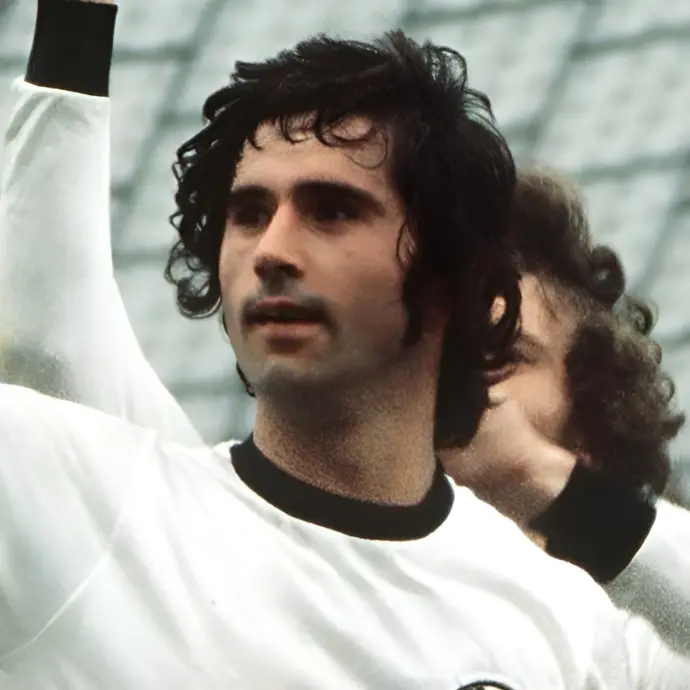
- Age : 28/29 years old
- Club : Bayern Munich
- Statistics : 57 games, 43 goals, 14 assists
- Trophies : World Cup, Champions League, Bundesliga
- Individual Awards : Champions League TOTY, Champions League Golden Shoe (8 goals), Bundesliga TOTY, Bundesliga Golden Shoe (30 goals)
In 1974, Gerd Müller was inevitability in cleats—compact, cold-blooded, and utterly unstoppable. At 28, “Der Bomber” didn’t just score goals. He ended arguments. That summer, on home soil, he delivered the final word in the World Cup final—his last goal for West Germany, and the most important of all. Against the Netherlands, in a match dripping with tension and brilliance, Müller struck just before halftime. A half-turn, a half-second, and the ball was in the net. It was his 14th World Cup goal, a record at the time. It was also his 68th for West Germany in just 62 appearances. He retired from international football that day—on top, as only Müller could. At Bayern Munich, he was no less ruthless. He scored 30 goals in the Bundesliga, leading the line as Bayern claimed their first-ever European Cup, dismantling Atlético Madrid 4–0 in the replay. Müller scored twice. Because of course he did.
#6 Johan Neeskens
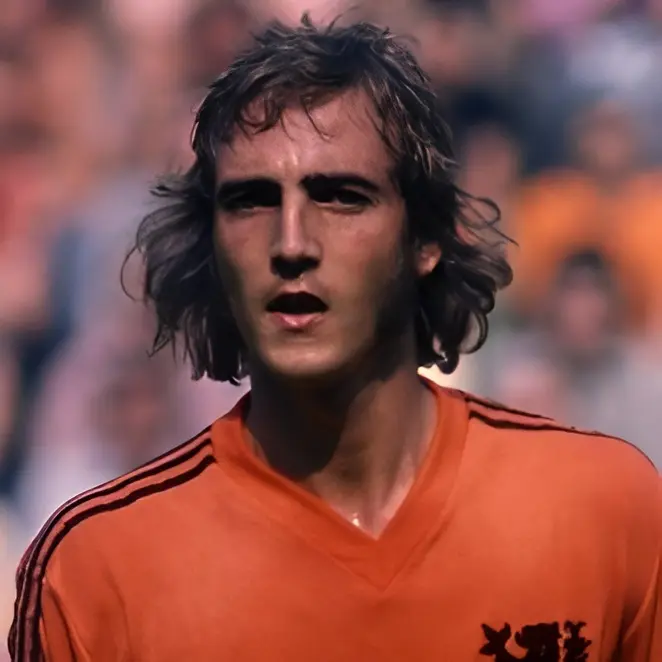
- Age : 22/23 years old
- Club : Ajax Amsterdam/FC Barcelona
- Statistics : 49 games, 21 goals, / assists
- Trophies : Finalist World Cup
- Individual Awards : World Cup TOTT
In 1974, Johan Neeskens was total football made flesh—relentless, versatile, and burning with purpose. At 23, he was the engine of the Netherlands’ revolution, the heartbeat of Rinus Michels’ vision. While Cruyff danced and Krol orchestrated, it was Neeskens who drove. Box to box, minute to minute, he never stopped. He didn’t just play the game—he chased it down, tackled it, and bent it to his will. That summer, on the grandest stage, Neeskens was incandescent. In the World Cup final, he scored just two minutes in—blasting a penalty past Sepp Maier before a German had even touched the ball. It was a moment of audacity, of dominance. And though the Dutch would fall to West Germany, Neeskens left the tournament as one of its brightest stars. He scored five goals from midfield, a feat of both stamina and steel. At Ajax, he had already conquered Europe. But in 1974, he took his talents to Barcelona, joining Cruyff in Catalonia to bring the gospel of Total Football to Spain. He didn’t arrive with fanfare—he arrived with fire. Tackling, passing, scoring, leading. He was the kind of player who made teammates better and opponents smaller.
#5 Paul Breitner
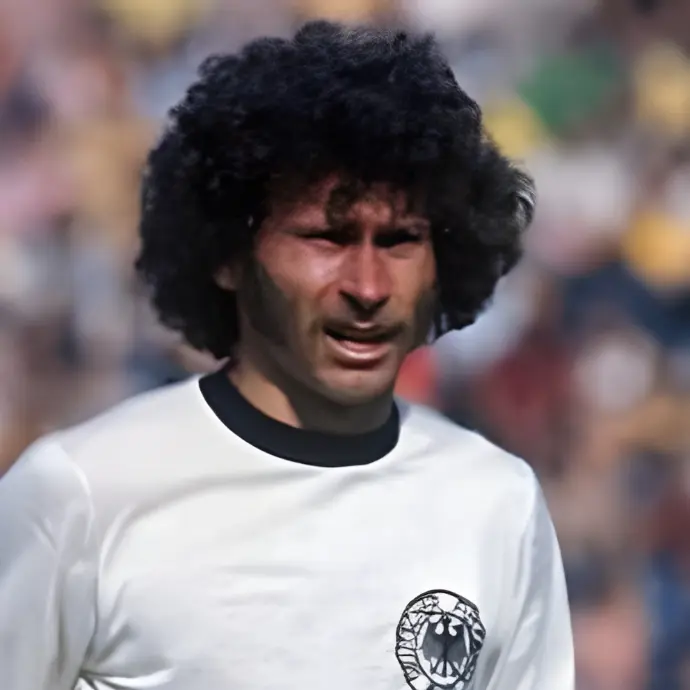
- Age : 22/23 years old
- Club : Bayern Munich
- Statistics : 54 games, 13 goals, / assists
- Trophies : World Cup, Champions League, Bundesliga
- Individual Awards : World Cup TOTT, Champions League TOTY
In 1974, Paul Breitner was fire wrapped in discipline—rebellious in spirit, but ruthlessly efficient on the pitch. At just 22, he was already a world champion, a European Cup winner, and the most defiant face of West Germany’s golden generation. That year, Breitner didn’t just rise—he exploded. In the World Cup, he was everywhere. A left-back by designation, but a midfielder, winger, and enforcer by instinct. He opened the scoring against Chile with a thunderbolt from distance, and in the final against the Netherlands, he stepped up to the penalty spot with ice in his veins. One strike, one goal, and West Germany were level. It was the moment that turned the tide—and Breitner delivered it. At Bayern Munich, he was part of the machine that steamrolled Europe. The Bavarians lifted their first European Cup in 1974, and Breitner was its pulse—tireless, fearless, and always in motion. He didn’t just defend. He dictated. He didn’t just run. He roared.
#4 Elías Figueroa
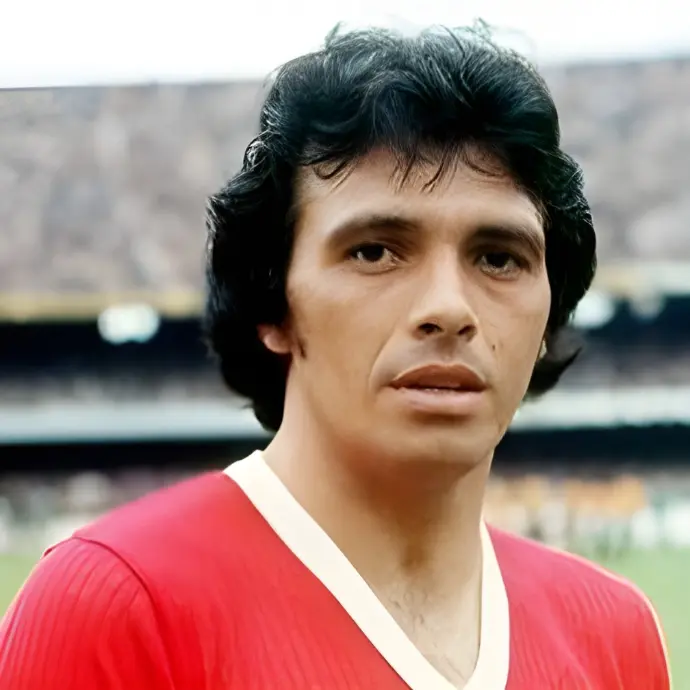
- Age : 27/28 years old
- Club : Internacional
- Statistics : 38 games, 2 goals, / assists
- Trophies : Rio Grande do Sol Championship
- Individual Awards : South American POTY, South American TOTY, World Cup TOTT
In 1974, Elías Figueroa was elegance in armor—imposing, unflinching, and impossibly refined. At 28, he wasn’t just the best defender in South America—he was its monument. That year, at Internacional in Brazil, he didn’t merely anchor the back line. He elevated it. With every interception, every perfectly timed tackle, every stride forward from defense, Figueroa made the game look like sculpture in motion. He was named the South American Footballer of the Year in 1974, the first of three consecutive times—a feat no defender had ever achieved. In a continent bursting with attacking brilliance, it was a center-back who stood tallest. Because Figueroa didn’t just stop goals. He stopped time. He read the game like a scholar, moved like a dancer, and led like a general. For Chile, he was the captain, the calm, the constant. And though the national team didn’t shine that year, Figueroa’s light never dimmed. In Brazil, he was revered. In Uruguay, remembered. In Chile, immortal. He didn’t need to shout. He didn’t need to chase. He simply positioned himself where the danger would be—before it even arrived.
#3 Kazimierz Deyna
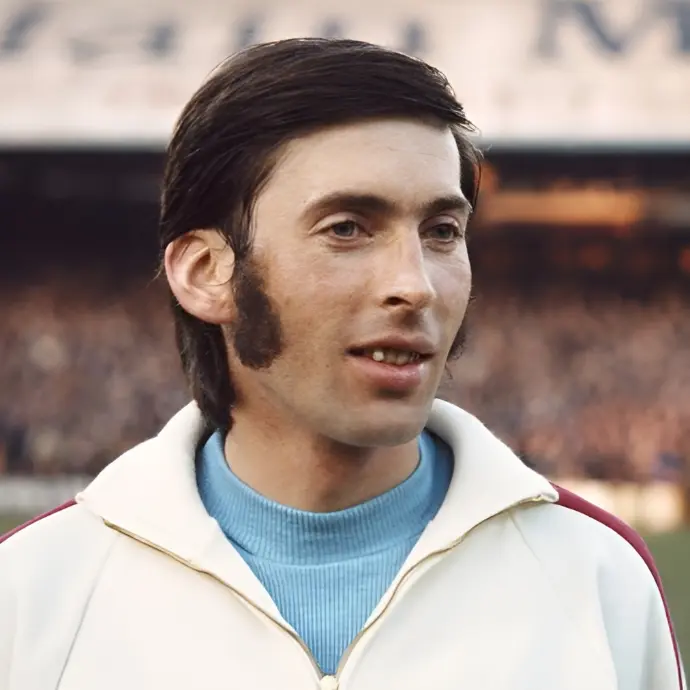
- Age : 26/27 years old
- Club : Legia Varsovia
- Statistics : / games, / goals, / assists
- Trophies : /
- Individual Awards : Polish POTY, World Cup TOTT
In 1974, Kazimierz Deyna was the general on the pitch—measured, majestic, and utterly magnetic. At 26, he didn’t just lead Poland’s golden generation—he embodied it. That summer in West Germany, Deyna was at the height of his powers, orchestrating every Polish attack with a calm authority that made chaos look composed. He wasn’t the fastest, nor the flashiest. But he saw the game seconds before anyone else. With his head always up and his feet always sure, Deyna dictated tempo like a maestro. Long balls, short flicks, curling free kicks—he delivered them all with the same effortless grace. And when Poland stunned the world to finish third at the World Cup, it was Deyna who wore the armband, who pulled the strings, who made it all possible. He scored twice in the tournament, but his influence went far beyond the scoresheet. He was named the best playmaker of the World Cup and earned a place in the tournament’s All-Star Team. That same year, he finished third in the Ballon d’Or voting—behind only Cruyff and Beckenbauer. At Legia Warsaw, he was already a legend. But in 1974, he became something more: a symbol. A footballer who could carry a nation’s hopes with elegance and steel. They called him “The General,” and never was the title more fitting than that year.
#2 Johan Cruyff
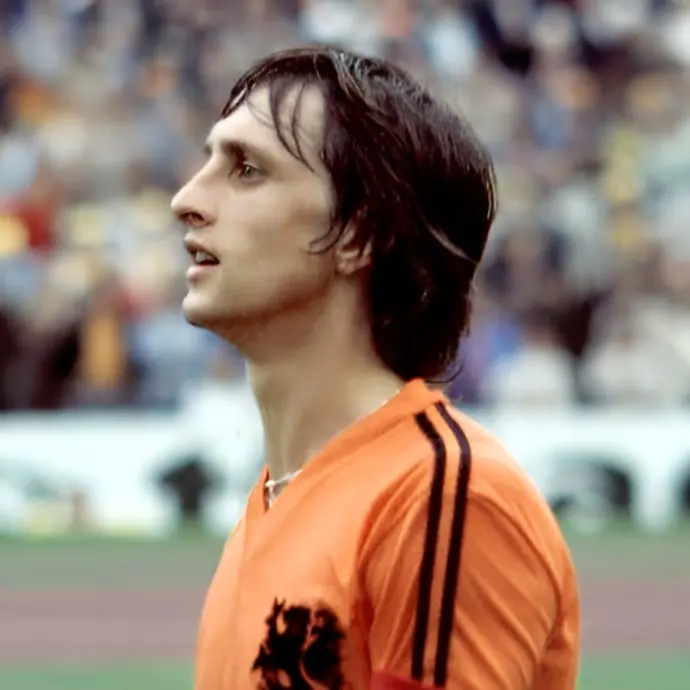
- Age : 26/27 years old
- Club : FC Barcelona
- Statistics : 48 games, 21 goals, 21 assists
- Trophies : Finalist World Cup, Liga
- Individual Awards : World Cup POTT, World Cup TOTT, Liga TOTY
In 1974, Johan Cruyff was the game’s great illusionist—visionary, volatile, and utterly transcendent. At 27, he wasn’t just the best player in the world. He was the future, arriving early. That year, Cruyff didn’t just lead the Netherlands to their first World Cup final—he redefined what football could be. With the number 14 stitched across his back and Total Football stitched into his soul, Cruyff orchestrated a Dutch side that played like no team before it. He didn’t stay in one position—he became all of them. He dropped deep, surged forward, drifted wide, and always, always saw the pass before anyone else knew it was there. Against Argentina, he danced. Against Brazil, he dominated. And in the final, he drew a penalty before a German had touched the ball. It was a moment of pure Cruyff: audacious, brilliant, inevitable. Though the Dutch fell to West Germany, Cruyff was crowned the tournament’s best player. He was everywhere and everything. And that same year, he claimed his third Ballon d’Or—joining the pantheon of the sport’s immortals. At Barcelona, he had already transformed a club and a city. In his first season, he led them to a league title and delivered a 5–0 demolition of Real Madrid at the Bernabéu—a match still spoken of in reverent tones. He wasn’t just a player. He was a philosophy in motion.
Winner : Franz Beckenbauer
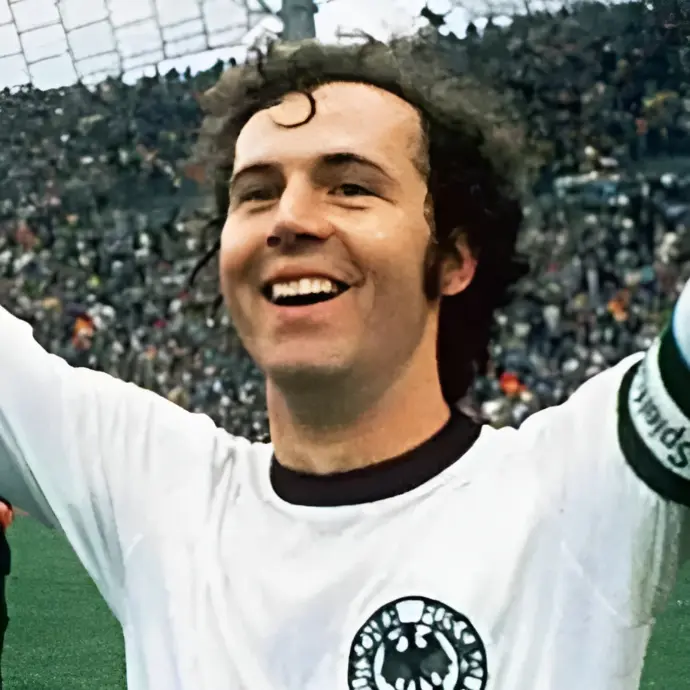
- Age : 29/30 years old
- Club : Bayern Munich
- Statistics : 61 games, 5 goals, 9 assists
- Trophies : World Cup, Champions League, Bundesliga
- Individual Awards : German POTY, World Cup TOTT, Champions League TOTY, Bundesliga TOTY
In 1974, Franz Beckenbauer was command in its purest form—graceful, cerebral, and utterly unshakable. At 29, he wasn’t just the captain of West Germany. He was its compass. That summer, on home soil, he led his nation to World Cup glory—not with fire, but with flawless control. He didn’t shout. He didn’t chase. He glided. From the libero position he had redefined, Beckenbauer orchestrated every movement like a maestro with a metronome. Against the Netherlands in the final, he faced the whirlwind of Total Football—and calmed it. While Cruyff danced, Beckenbauer dictated. He didn’t need to tackle. He was already there. At Bayern Munich, he was the cornerstone of a dynasty in bloom. That year, Bayern lifted their first European Cup, and Beckenbauer was the spine of it all—cool under pressure, elegant under fire. He was named German Footballer of the Year.